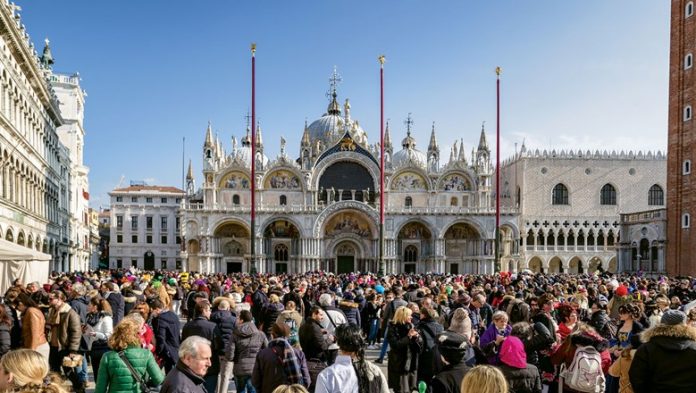The city of Venice is poised to impose a tax of up to $11 on day visitors to its historic city center, a move that mayor Luigi Brugnaro said would help defray costs of maintaining the popular tourist destination.
Some travel companies, however, called it an impractical money grab that would have little impact on crowds. They also questioned how it would be implemented to exclude commuters and students.
Brugnaro announced the tourist tax, which was authorized by the central government in Italy’s 2019 budget, on Twitter. He said the levy, which could range from 2.5 to 10 euros, “will help us to better manage the city, keep it clean and offer visitors better services.”
Cruise lines, which have been engaged in an ongoing battle with activists who want to ban large ships in Venice, said they were disappointed that the Italian government supported the proposal. But cruise trade group CLIA said it would wait to see how Venice proceeds before responding further.
“Cruise companies have already voluntarily agreed not to send ships bigger than 96,000 tons to Venice, steadily reducing the number of cruise passengers visiting the city since 2014,” CLIA Europe said in a statement. “We recognize that Venice is a unique destination, and the cruise industry is deeply committed to protecting its cultural heritage and safeguarding its sustainability. The city is a treasure, and ensuring its preservation is crucial for all who live and work here, and indeed all of us who love it.”
Tom Jenkins, CEO of the European Tour Operators Association, called the move an attempt to make money off the popular anti-tourist movement. Further, he questioned how it would be carried out.
“How do you actually sort the tourists from non-tourists,” he asked. “Venice is a city that now relies on a big influx of workers coming in from the mainland to keep everything running. You’ve also got this statement that they don’t like people not staying in Venice at the same time they don’t like people staying in Venice because it displaces residents.”
The move comes as Rome on Jan. 1 implemented a permitting process to significantly limit the number of coaches in its city center.
Jenkins called that move, which was floated to reduce emissions and improve air quality, “idiotic.”
“Each coach occupies the road space of one-and-a-half cars and, per person, delivers a fraction of the emissions,” he said. “Yet we are being asked to exclude coaches in Rome and replace them with up to 20 taxis. This is madness. How can you reason with madness?”
Given the current political climate and backlash against overtourism, he said, the administration in Venice “had to be seen as doing something. All we plead for, as ever, is due notice. The industry needs well-run cities. It recognizes that taxes have to be paid. But they must be levied on a fair basis with due notice applied.”
Travel agents who specialize in Italy said the move appeared to be targeting cruise lines but questioned if it would have any practical impact.
“I don’t think so,” said Brian Dore, owner of CIU Travel in Westbrook, Conn. “Last year, they set up temporary barriers to try to restrict access to certain parts of the city at certain times of the day and stuff like that. I don’t know that that really did much of anything.”
Clark Mitchell, a cruise specialist with Strong Travel Services in Dallas, agreed, saying, “In my humble opinion, this is nothing but revenue generation.”
Diana Hechler, president of D. Tours Travel in Larchmont, N.Y., however, described the move as being reasonable.
“While Venice serves as Italy’s Disneyland, it is also a poster-child for the dangers of overtourism that we’re all hearing a lot about these days in the industry,” she said. “The city is a finite area. They cannot just build more facilities in outlying areas like a theme park can. They have to work with the limits of their geography. The tax is not very high but if it pays for more cleaning and support services in the city during peak periods, I think it’s very reasonable.”
___
























